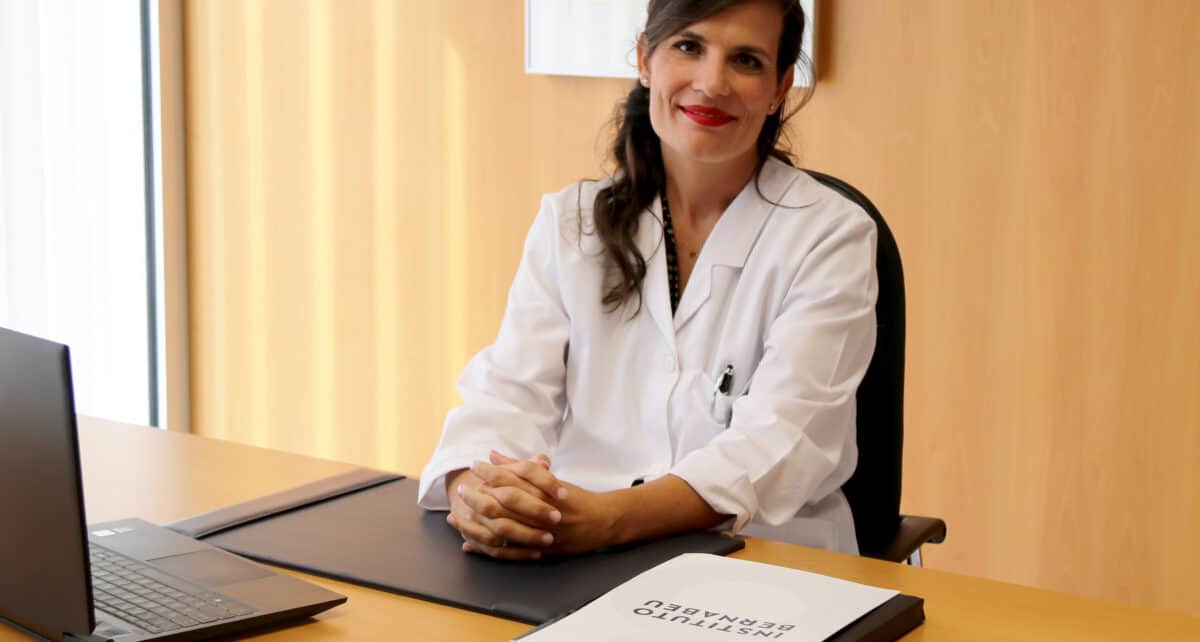“We are educated to prevent pregnancy, but we are not explained what are the consequences of dealying motherhood”
08-03-2023

Instituto Bernabeu medical co-director, Dr Andrea Bernabeu, advocates prevention, dissemination and science as the base pillars to face the infertility problems of the 21st century.
Raquel is 39 years old and she’s been looking for pregnancy for a year now without success. She has just been to a reproductive medicine clinic where she has been told her eggs are not enough, nor are they of sufficient quality, to be able to become a mother.
Raquel’s is not an exceptional case. Around 15% of Spanish couples suffer from infertility. And age is one of the main obstacles to achieving pregnancy. At the age of 30 a woman has half the chance of becoming a mother than at the age of 20-24. And after the age of 35 it decreases considerably. Today, Spanish women are having their first child later and later, the average age is almost 32, compared to 25.6 years in 1980.
“A woman’s suffering for her infertility cannot be described with words”. As a modern woman and as a specialist in reproductive medicine, Dr Andrea Bernabeu is aware of the social changes affecting women in our century.Work, financial stability or the desire to enjoy other things in life, among other reasons, lead to the delay of motherhood. “The problem is that we are not ready to be told we cannot be mothers. We are not because nobody explained us that, on a biological level, our reproductive capacity is still the same as it was thousands of years ago», explains the specialist, who adds «it doesn’t matter how much we take care of ourselves. Despite the fact that we have made a great effort studying, working, etc., the biological clock penalizes us to become mothers».
From the age of 35 onwards, a woman’s ovarian reserve diminishes considerably: the quality and quantity of her eggs begins to fall. «We think that having periods is synonymous with being fertile, but this is not always the case,» adds Dr Bernabeu.
On the positive side of Rachel’s story is science. How reproductive medicine has evolved to go where biology does not help us. «Infertility presents us every day with challenges we must overcome with a multidisciplinary approach. At Instituto Bernabeu we have doctors, researchers, laboratories and cutting-edge technology that contribute to offering realistic and honest solutions for each patient».
«If I had known, I would have frozen years ago”. Raquel regrets not having cryopreserved her oocytes. Dr Bernabeu, recommends using this technique before the age of 35, which is biologically the best stage for freezing oocytes and allows them to be preserved in the best conditions. The cryopreservation technique has evolved considerably and allows the use of frozen oocytes for years with high success rates.
«At Instituto Bernabeu we do not understand our medical work separately from our scientific and informative work. We understand that our contribution to society includes healing, but also the transfer of knowledge and support for those who need us. We are subjected to multitude self-serving and inaccurate information. Not all techniques work for all patients. Honesty in medical practice is essential. By the same token, believing all information circulating on the internet makes us vulnerable,» says Dr Bernabeu.
Women who lead the future of reproductive medicine
86% of Instituto Bernabeu team is made of female people. Almost 90% of science is written by women scientists and a large part of management positions are occupied by women. The Group’s 9 clinics are under the medical direction of Dr Rafael Bernabeu and Dr Andrea Bernabeu. The Group is one of the few remaining in the world that is not made up of investment companies outside the medical activity.
The research and medical progress commitment is reflected in the incorporation of techniques and treatments that are at the forefront of reproductive medicine. They are pioneers in the development of genetic studies, in the application of pharmacogenetics to achieve the best results and in the use of Artificial Intelligence as a tool to individualize treatments and improve results for their three fundamental patients: the woman, the man and the embryo.
More than 400 investigations
Instituto Bernabeu’s scientists have developed more than 400 papers published in the world’s most important scientific research publications. The clinic is prominently present at the world’s leading medical congresses and meetings on infertility, genetics and embryology. Its commitment to the generation of knowledge is reflected in the organization of congresses and conferences of interest to professionals and patients, such as the next medical meeting to be held on March 10th in the clinic’s Auditorium in Alicante through its University Chair of Community Medicine and Reproductive Health at the Miguel Hernández University (UMH). At this conference, renowned experts will meet to address the women’s reproductive health in the 21st century.
The trust of patients from all over the world
Instituto Bernabeu has 8 clinics in Spain and one in Italy. Located in Madrid, Alicante, Palma, Albacete, Cartagena, Elche, Benidorm and Venice, all the centers have a multidisciplinary team of professionals including gynecologists, molecular biologists, geneticists, urologists, endocrinologists and psychologists, among others, who attend patients from 137 countries seeking solutions to their reproductive problems.
